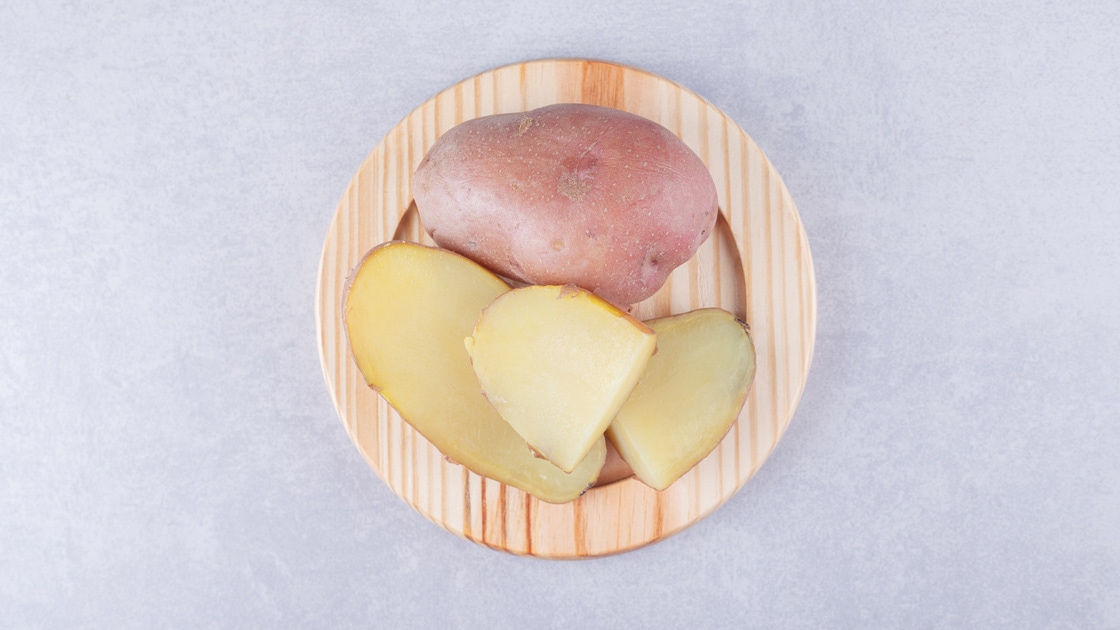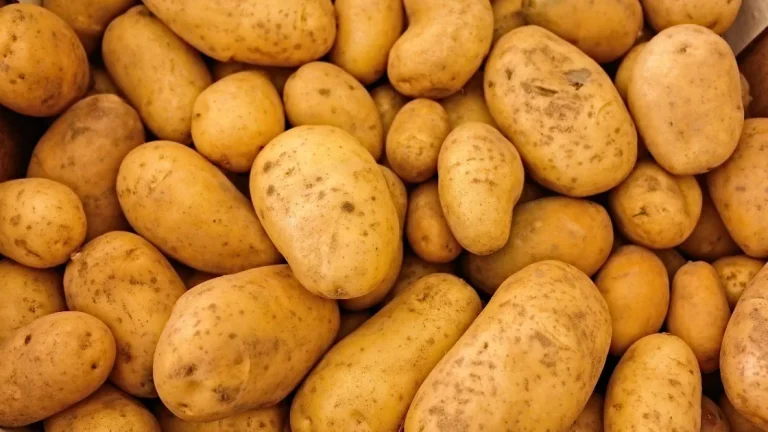- It can aid in weight loss when prepared correctly and consumed in the right portions
- Boiling, baking, steaming, mashing, or roasting potatoes can be a nutritious and satisfying addition to your diet
- Boiled potatoes are high in fiber and can help you feel fuller for longer, reducing unnecessary snacking
- There are many ways to add flavor to potatoes without increasing fat content, such as using spices or herbs
- Avoid processed potato products, high-calorie toppings, and excessive alcohol consumption when following a potato diet
Looking to shed some pounds?
Look no further than the humble potato!
Contrary to popular belief on weight gain, potatoes can actually aid in weight loss when prepared correctly and consumed in the right portions.
While they may be known for their high carbohydrate and calorie content, research is starting to debunk the myth that potatoes are detrimental to weight loss efforts.
In fact, when boiled, baked, steamed, mashed, or roasted, potatoes can be a nutritious and satisfying addition to your diet.
Say goodbye to french fries and hello to a variety of delicious, healthy diet potato recipes that will lead to weight shedding in no time.
If the newer methods are uncharted territory for you, do not fear.
We have some sensational best potato recipes to fight against obesity to share with you that would get you mashing the extra inches away.
The Best Baked Potato Recipe To help you lose weight
- Make your own chips.
Delicious chunky fries, wedges, or circular baked oven potato chips can be a hit with the whole family.
Baking rather than frying reduces the fat quantity and proves to help the potato maintain its natural nutrient content.
An easy way to make them at home is to slice up cleaned, rinsed potatoes, then shake the pieces out onto a roasting pan.
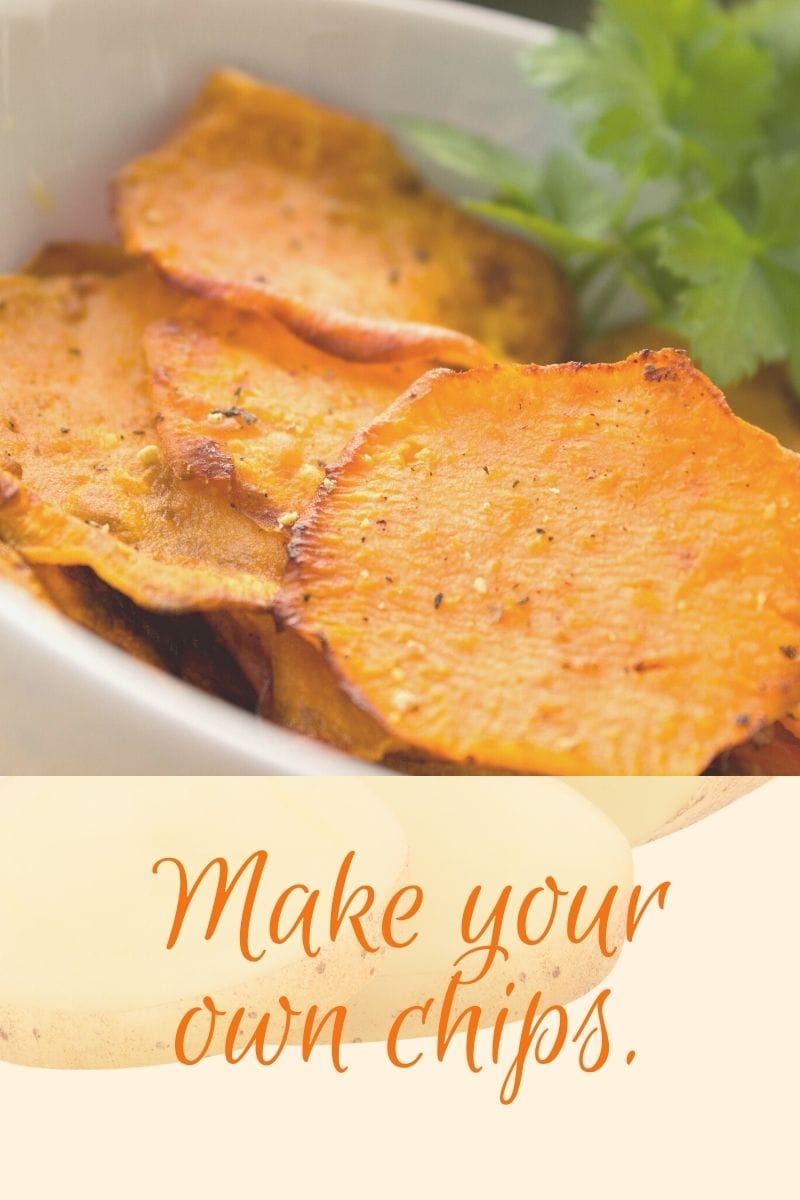
Drizzle with a little olive oil, ensuring each chip is evenly coated, then season well.
Bake for about 15-20 minutes before taking them out, giving them a good old-fashioned toss, and returning them to the oven for 5-10 minutes.
That’s all it requires to enjoy healthier, guilt-free chips!
- Make healthy mashed potatoes
Mashed potato is velvety smooth and is a healthy eating way.
This method keeps the potato low in saturated fat but high in potassium.
A serving contains (100 grams) about 150 calories per medium potato) and these are no empty calories, either.
Those calories contain countless vitamins, dietary fiber, and clinical nutrition.
So, nutrition and calorie-wise, potatoes for weight loss are greatly beneficial.
To make a flavor-packed yet healthy bowl of mashed potato, consider the following:
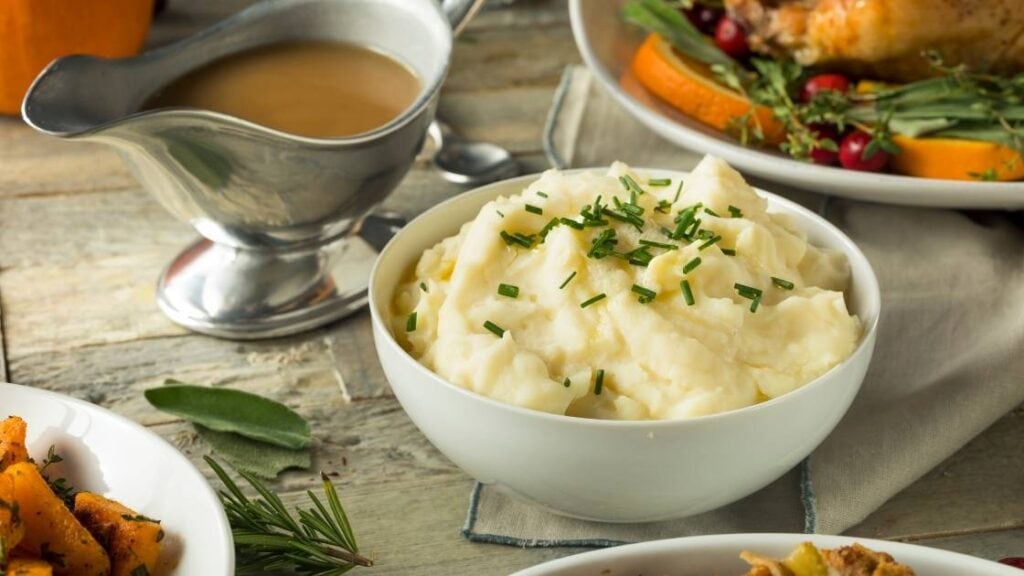
Boil your potatoes by placing them in a large pot and fill with salted water to cover them by about one inch.
Bring to a boil over high heat, then change the setting to low. Cover and simmer for 15-20 minutes until potatoes become tender.
Once done, safely drain and place the potatoes back in the pot mixing bowl.
Let your arms get involved in mashing up those potatoes with your masher.
Next, add chicken broth, butter, milk, fat-free Greek yogurt, and olive oil to already mashed potatoes and whisk until fluffy and light.
Add salt and pepper to taste, and whisk once again so all ingredients melt away before finally garnishing with parsley, at which point it’s ready to be served.
- Try boiled potatoes
Boiled potato is high on the satiety ranks, which measures how filling different foods are based on how they satisfy you.
Boiled potatoes can help in losing weight with little effort as they have almost the same number of calories as a sweet potato or turnip – which is great news when trying to shed off those extra pounds.
Potatoes are also known to be a good source of fiber, so you stay full for longer, thus eliminating unnecessary snacking and ultimately assisting in weight loss.
A good way to prepare them is to place the potatoes in a large saucepan and cover them with cold water by an inch.
Bring to a boil on high heat.
Cook the potatoes until tender but not falling apart – 15 to 20 minutes should be perfect.
Drain the water and transfer the potatoes to a bowl.
Add your sea salt and some chopped mint and basil. Finally, toss with a little olive oil and serve.
You can use white, red, purple, or sweet potatoes for a regular potato diet.
Famous American biologist Chris Voigt ate potatoes 60 days straight as a part of the weight loss diet.
Chris Voigt proved that the carbohydrate of potatoes is not harmful to weight loss, but it can be used as a part of a healthy diet.
Another famous Magician, Penn Jillette, also uses a potato diet for weight loss. He thinks that plain potato is far better than white rice.
Tim Steele wrote a book about the potato diet named Potato Hack.
- Add flavor without the fat
There are many alternatives to adding a new flavor to potatoes without increasing the fat content or upping the calories.
Consider the following methods rather than adding fats, salts, sour cream, or sugar for flavor.
- Eating potatoes in season – You will be amazed at how much better produce tastes when it’s purchased in season
- Roast your potatoes – Roasting potatoes unleashes all that tasty goodness as well as retains the rich nutrients within them.
- Make your own dressings or sauces – This gives you the assurance of knowing exactly what’s been added to your potatoes and the quantity of each ingredient.
- Spice it up – Adding spices to your plain potato, like black pepper, paprika, garlic, and onion powder, all create a really mouthwatering dish.
- Season your potatoes with herbs – Fresh chives, thyme, and rosemary add flavor without any additional fat.
- Ditch the high-fat cream
Though high-fat creams seem to take your dishes to the next level, they will take your weight to that level to match.
The good news is that many healthy substitutes are equally tantalizing, such as:
- Milk and butter.
- Soy milk and olive oil.
- Milk and cornstarch.
- Half-and-half and butter.
- Silken tofu and soy milk.
- Greek yogurt and milk.
- Evaporated milk.
- Cottage cheese and milk.
Potato Diet: How to Go About It?
If you’re considering trying the potato for weight loss, it’s important to know about the potato diet.
Here are some steps to help you go about it:
Consult with a healthcare professional:
Before starting any new diet, it’s always a good idea to consult a healthcare professional or a registered dietitian.
They can assess your needs and help you determine if the potato diet is suitable for you.
Choose the right potatoes:
When following the potato diet, it’s important to choose the right type of potatoes.
Opt for nutrient-dense varieties like sweet potatoes or purple potatoes, which offer additional health benefits compared to white potatoes.
Control portion sizes:
While potatoes can be a part of a healthy weight loss diet, it’s crucial to control portion sizes.
Stick to recommended serving sizes and avoid overeating.
Balance your meals:
While the potato diet may focus on potatoes as the main source of carbohydrates, it’s important to include other nutritious foods as well.
Be sure to incorporate protein, healthy fats, and plenty of fruits and vegetables into your meals to ensure a well-rounded diet.
Stay hydrated:
Adequate hydration is important if you are trying to lose weight.
Be sure to drink plenty of water throughout the day, especially if you’re following a high-fiber diet like the potato diet.
Foods to Avoid in Potato Diet
While the potato diet can be a great way to aid in weight loss, certain foods should be avoided to maximize its effectiveness.
Here are some foods to avoid when following the potato diet:
Processed potato products:
While whole potatoes are nutritious, processed potato products like chips, fries, and instant mashed potatoes should be avoided.
These products are often high in unhealthy fats, sodium, and additives.
High-calorie toppings:
Be mindful of the toppings you add to your potatoes. Avoid high-calorie options like butter, sour cream, and cheese.
Instead, choose healthier alternatives like Greek yogurt, herbs, and spices for flavor.
Sugary beverages:
Sugary beverages like soda, fruit juices, and energy drinks can sabotage your weight loss efforts.
These drinks are high in calories and offer little to no nutritional value. Stick to water, unsweetened tea, or infused water for hydration.
Highly processed foods:
In general, it’s best to avoid highly processed foods when following any weight loss diet.
These foods are often high in added sugars, unhealthy fats, and preservatives, hindering your progress.
Excessive alcohol consumption:
While moderate alcohol consumption can be a part of a healthy lifestyle, excessive alcohol intake can hinder weight loss.
Alcoholic beverages are high in calories and can lead to overeating.
Foods to Eat in Potato Diet
While potatoes are the star of the potato diet, it’s important to include other nutritious foods to ensure a well-balanced diet.
Here are some foods to include when following the potato diet:
Lean proteins:
Include lean protein sources like chicken breast, turkey, fish, tofu, or legumes.
Protein helps keep you feeling full and supports muscle growth and repair.
Fruits and vegetables:
Incorporate a variety of fruits and vegetables into your meals.
These foods are low in calories and high in vitamins, minerals, and fiber.
They can help add flavor, texture, and nutritional value to your diet.
Whole grains:
While potatoes are a good source of carbohydrates, it’s important to include other whole grains like quinoa, brown rice, or whole wheat bread in your meals.
Whole grains provide additional fiber and nutrients.
Healthy fats:
Include sources of healthy fats like avocados, nuts, seeds, and olive oil in your diet.
These fats are essential for overall health and can help satisfy you.
Low-fat dairy or dairy alternatives:
If you consume dairy products, choose low-fat options like Greek yogurt or skim milk.
If you’re lactose intolerant or follow a plant-based diet, opt for dairy alternatives like almond milk or soy yogurt.
By including these foods in your potato diet, you can ensure that you meet your nutrient needs while promoting weight loss.
Remember to focus on portion control and balance to achieve the best results.
Are Potatoes Good for weight loss?
The potato has proven quite beneficial and can be substituted for other carbohydrates in our balanced meals.
They are known to rank low on the hypoglycemic index, so it is a safer alternative for people with diabetes.
They also contain substantial amounts of vitamins, including vitamin A, B6, vitamin C, and complex carbohydrates, specifically responsible for releasing energy in the digestive system at a slower pace.
Potatoes possess a respectable amount of potassium and fiber, which lowers blood pressure levels timeously, which in turn aids in regulating your digestion and eradicating cholesterol.
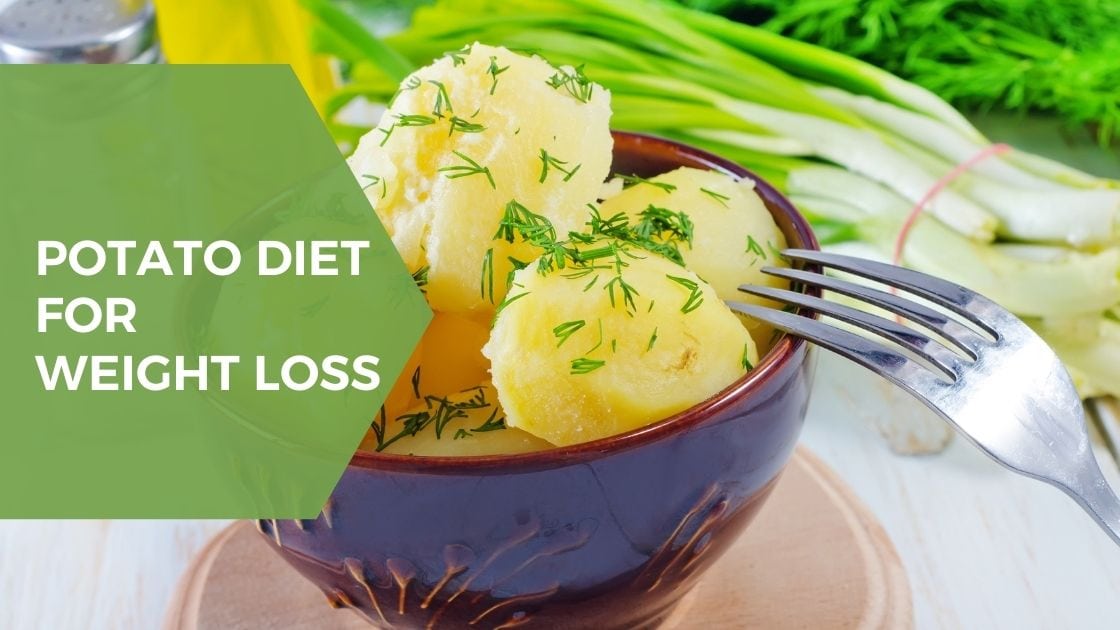
The more significant benefit is that it induces satiety in our systems, so it significantly reduces our nibbles and cravings in between our meals, which will of course, proportionately assist us with weight loss.
A recent study also revealed that boiled potatoes’ cooling process allows them to form a high amount of resistant starch, which is amazingly useful for regulating metabolism, fighting off excess fat, and promoting many other health benefits.
Every part of the potato is nutrient-packed, so don’t throw away the peels, either.
Potato skins are jam-packed with iron, which is vital for carrying oxygen throughout our bodies.
The skins are also a source of vitamin B3.
This vitamin offers assistance to cells to break down nutrients into usable fuel.
In addition, vitamin B3 also helps your cells recover from physiological stress.
The potato’s skin gives you as much fiber as the potato itself.
Why Not Eat Potatoes?
Potatoes are one of the most easily accessible, cost-effective, and fulfilling carbs.
And now we know that potatoes can assist in our weight loss journey.
Consuming potatoes in their correct portions and adapting healthier cooking methods could give you the boost you require to wobble off the pounds.
It will keep you satisfied for longer and support your overall digestive system.
With so many advantages, why not include some of our potato weight-loss recipes in your diet?
